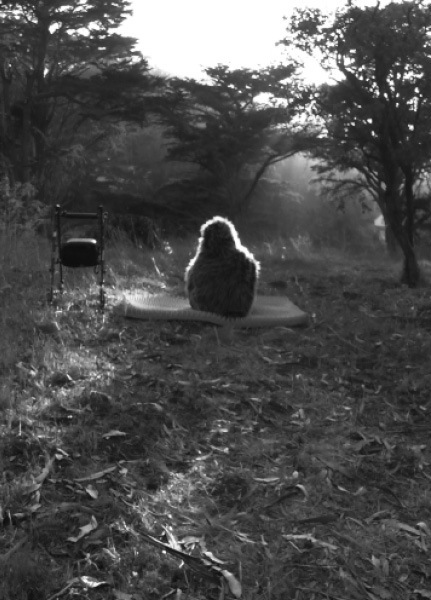
I LOVE NATURE, AND NATURE LOVES ME.
first performed on November 9, 2020
Headlands Center for the Arts, Marin, CA
performed eight times in 2020
JILLIAN CROCHET
Oakland, CA
208630826j208630826i208630826l208630826l208630826i208630826a208630826n208630826c208630826r208630826o208630826c208630826h208630826e208630826t208630826@208630826g208630826m208630826a208630826i208630826l208630826.208630826c208630826o208630826m
jilliancrochet.com
I LOVE NATURE, AND NATURE LOVES ME.
JILLIAN CROCHET
“I love nature, and nature loves me.” was a performance in isolation for a potential audience hoping to connect once it became safe. Isolation and longing were central themes during the COVID-19 pandemic in 2020. When I started my residency at the Headlands Center for the Arts, I found refuge in the surrounding natural environment and wildlife. A bobcat would visit daily, and I longed to become her friend. I created a bobcat cape and put together a wild cat outfit. In this performance series, I repeatedly take my foam pad to the spot where the bobcat would come and visit, in hopes to see her again. The camera watches me waiting for potential interaction. The camera acts as part wildlife cam and part surveillance cam, blurring the line of spectacle/entertainment and the surveillance/regulation of bodies. Am I the wildlife? Am I the surveilled body? Am I surveilling? An oscillation of the subject/object relationship reflects and unsettles our understanding of nature.
COVID-19 brought to light an alarming disregard for disabled bodies, in this eugenicist culture where the economy is more important than saving lives. As a disabled and vulnerable body, the blatant disregard for my safety and the safety of other vulnerable bodies has been extremely upsetting. What bodies are important, worthy?
I, like many people who have been shielding, have found solace in nature. However, joy is often interrupted by the inaccessibility of our built environment. What we think of as ‘natural’ is in fact built. This work investigates the relationship between man-made/maintained nature and the disabled body. What bodies are included/excluded? What is natural/unnatural? All of the trails in parks are built and maintained but only for certain bodies. Parks are seen as a place for physical exercise—hiking and walking. In these performances, I struggle to get to a small patch of grass using my walker because there are no accessible paths or trails nearby. I bring a foam pad for rest. The disabled body needs rest—all bodies need rest. In our society, rest is pathologized and capitalism demands exhaustion as a means to maintain oppression. The grind and pace of capitalism are untenable. Rest can be a form of resistance. Resting is the only way for my body to heal, to survive. The disabled body subverts expectations about how a body should look, perform, and produce.